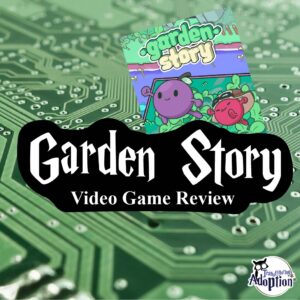
Garden Story (2021) – Video Game Review
Discussion Packet
Garden Story (2021) – Discussion Guide
Discussion Guide:
- Why is Concord named that?
Caregiver Note: This is a funny question to break the ice in talking to your child. Children often struggle with talking face-to-face out of nowhere and may need help easing into conversation. This is also practical in that not every child may catch the pun connecting Concord to a type of grape. Enjoy some giggles at little Concord’s expense. - What did Concord do while living in the Kindergarden?
Caregiver Note: Concord’s job, as the last one in the Kindergarden, is to take care of the vine and likely to care for the Kindergarden. This appears to be a very monotonous, lonely lifestyle as Concord waters the vine, hydrates themselves for nourishment, and sleeps. While this may seem boring I’m sure there’s a reassurance with the comfortable routine for Concord. Every day Concord knows exactly what they must do by the end of day and exactly what the consequences are for not completing those tasks. However, this changes very quickly as you start the game. - What did Concord need to learn upon leaving the Kindergarden?
Caregiver Note: All at once Concord must find a weapon to defend themselves with, move to a new home, learn to defend themselves, and find new places to nourish themself. While this may not seem like a big deal the felt safety of living in the Kindergarden is suddenly gone. Where before there was safety in the monotony now there is potential danger every walk home or to the local store. For such a young character this must feel overwhelming. This is much like the stress your child likely experienced when they first came to live with you. Prior they likely had a completely different set of rules and expectations so coming to a new home with all new rules and expectations can be a lot to learn. With this in mind caregivers need to be patient with children as it may take some time to unlearn past behaviors and patterns and relearn new ones. - Who taught Concord how to defend themselves?
Caregiver Note: Plum is key in teaching Concord how to defend themselves. While Plum is a little more laid back than I would be with fighting Rot, they do a great job of giving Concord the space to learn and make his presence a safe place to make mistakes and learn new skills for the first time. As a caregiver it’s important to be attuned to your child’s needs but also to have the patience to allow your child to learn new skills. This can sometimes mean learning from mistakes. It’s important to remember that children need lots of space to practice and learn from their mistakes for some tasks. - By the end of the game Concord is becoming the top guardian. Has there been a time where you worked really hard and are proud of how much you improved?
Caregiver Note: This is a question meant to help your child with insight and recognizing achievements. Children will become discouraged if they constantly feel like they are messing up or not doing things right. It’s important for caregivers to maintain a strength-based approach to growth and help their children remember that it’s okay for things to feel difficult. Help your child connect to a time where they were able to overcome those hard parts and succeed so that later you can remind them that they have worked through and adapted before and, with your help, can certainly do it again. - Concord seemed to take great care of the Kindergarden. How does he help take care of the other places he lives?
Caregiver Note: Throughout the game Concord helps out the various towns and the folks that live in them. There are all sorts of creatures that live in these towns like frogs, seafolk, plantfolk, and more. Each of these towns have needs just as unique as the folks that live there and communicate these needs through the task boards in each area. In addition to fighting off Rot Concord helps these towns by taking on these daily tasks to better the community and make it more comfortable for folk to move back. - When Concord fills up the library inventory he is able to learn how to make different things for the town. How do these items help the townsfolk?
Caregiver Note: The game often mentions how Rot dislikes the sun and likes to come out at night. It only makes sense that in addition to aesthetics lampposts will help the various folk to make their way around the Rot at night and avoid danger. This also makes it easier for them to continue with daily tasks needed to live in these areas, much like putting out more item storage areas and other items. While Concord may also benefit from these items he is mostly helping invest in the communities he has now joined to make them better places to live for others too. - Once much of the Rot is gone are only guardians able to take care of tasks?
Caregiver Note: Just as Plum teaching Concord how to survive outside of the Kindergarden helped him, Concord taking care of the Rot and initial barriers for these communities helps others participate more in their communities. It’s important to remember that though we may love our communities it’s important to put that love to action by also helping our neighbors to participate as well to grow and nourish our neighborhoods and communities. - What sorts of things can people do to help our community? What are some areas in need of improvement?
Caregiver Note: This question will help your child start to think how they, like little Concord, are also members of a greater community. Help your child think of the things they are passionate about in their area and things that could improve the community. - How can you help with some of those goals for improving our community? What kinds of ways can you be like Concord?
Caregiver Note: While there are many barriers a child is unlikely to influence they can be creative in thinking of things they can do and control. Could they help pick up our Rot (trash) from the walkways and roads? Start recycling and telling their friends about how to recycle? Can they participate in local drives to raise resources for others that need them? There are as many solutions out there as there are problems. Maybe helping with one small task may be small to you but for someone else in the community that task may be the agent of change for them in a domino effect of continuing to invest in and nourish the local community.
About the Reviewer: Rachael Rathe
Rachael B. Rathe is an East Tennessee native with a Bachelor of Arts Degree in Psychology with a Minor in Child & Family Studies from The University of Tennessee Knoxville. She has worked in mental health since 2013 and in foster care/adoptions for a private provider agency since 2014. Rachael was inspired to work in the field after working with children and teens on a volunteer basis 2008 – 2013. Rachael’s ideal self-care day involves snuggling on a couch with her kitties (Tabitha, Fergus, and Rufus) while enjoying a good movie or book. She also enjoys galavanting around conventions concerning all things nerd and geekery.
**Transfiguring Adoption is a nonprofit organization seeking to nurture growth in foster and adoptive families by giving a HOOT about their families. Transfiguring Adoption does not intend for its reviewers nor its review to be professional, medical or legal advice. These reviews and discussion guides are intended to help parents to better be able to connect and understand their children who come from traumatic backgrounds.
